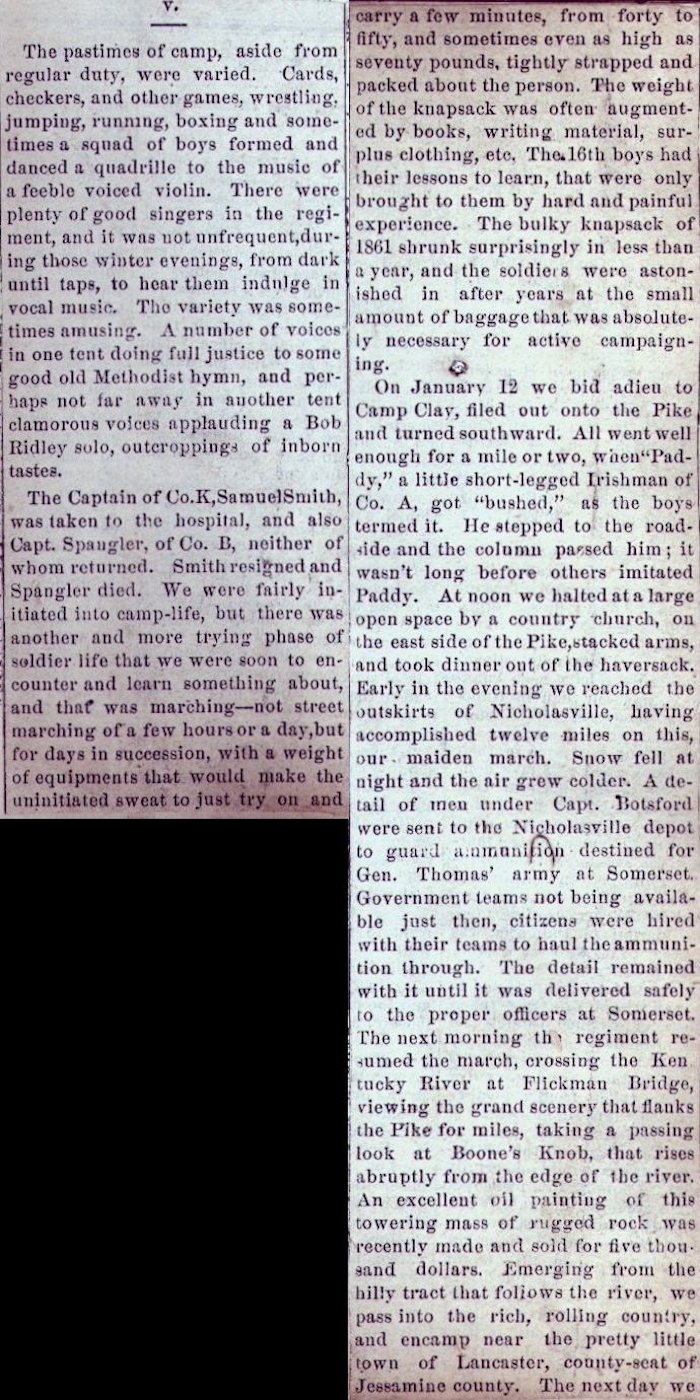| Camp & Field Page 6 | Camp & Field Index Page | 16th OVI Home Page | Camp & Field Page 8 |
The Camp & FieldArticles by Theodore Wolbach |
 Cpl. Theodore D. Wolbach |
The following image is taken from a book titled "Mortality and Statistics of the Census of 1850" in which it is believed retired Captain Rezin H. Vorhes, Company H, pasted over the pages a series of articles written by Cpl. Theodore D. Wolbach, Company E, titled "Camp and Field" and published, by chapter, in the Holmes County (Ohio) Republican newspaper from February 24, 1881 to August 17, 1882. The articles tell the story, in great detail and color, of the 16th OVI, from the inception of the 3-year regiment in October, 1861, through all its camps, battles and marches until it was disbanded on October 31, 1864. The articles pasted in the Vorhes book cover the first 35 chapters, published through October 20, 1881. All the remaining chapters were recently found in a Holmes County library by researcher Rob Garber who obtained copies, performed the transcriptions and provided to this website and which are also presented here, thus providing the complete work by Theodore Wolbach.
Throughout these articles click on the underlined white text for additional details.
The webauthor thanks 16th Ohio descendant Rob Garber for his excellent research on the Camp And Field articles and for performing the tedious digital transcription of those articles found on each page. The transcriptions were made to reflect the original articles verbatim, misspellings and all. Rob is the 3rd great nephew of Capt. William Buchanan, Company F, 16th Ohio, who served in the 90-day regiment as a private, re-enlisting in the three year regiment, and eventually making the rank of Captain of Company F. Thanks Rob!
Page 7 - Chapter 5 - January, 1862
 |
Published in Holmes County Republican V. The pastimes of camp, aside from regular duty, were varied. Cards, checkers, and other games, wrestling, jumping, running, boxing and sometimes a squad of boys formed and danced a quadrille to the music of a feeble voiced violin. There were plenty of good singers in the regiment, and it was not unfrequent [sic], during those winter evenings, from dark until taps, to hear them indulge in vocal music. The variety was sometimes amusing. A number of voices in one tent doing full justice to some good old Methodist hymn, and perhaps not far away in another tent clamorous voices applauding a Bob Ridley solo, outcroppings of inborn tastes. The Captain of Co. K, Samuel Smith, was taken to the hospital, and also Capt. Spangler, of Co. B, neither of whom returned. Smith resigned and Spangler died. We were fairly initiated into camp-life, but there was another and more trying phase of soldier life that we were soon to encounter and learn something about, and that was marching--not street marching of a few hours or a day, but for days in succession, with a weight of equipments [sic] that would make the uninitiated sweat to just try on and |
carry a few minutes, from forty to fifty, and sometimes even as high as seventy pounds, tightly strapped and packed about the person. The weight of the knapsack was often augmented by books, writing material, surplus clothing, etc. The 16th boys had their lessons to learn, that were only brought to them by hard and painful experience. The bulky knapsack of 1861 shrunk surprisingly in less than a year, and the soldiers were astonished in after years at the small amount of baggage that was absolutely necessary for active campaigning. On January 12 we bid adieu to Camp Clay, filed out onto the Pike and turned southward. All went well enough for a mile or two, when |
| Camp & Field Page 6 | Camp & Field Index Page | 16th OVI Home Page | Camp & Field Page 8 |